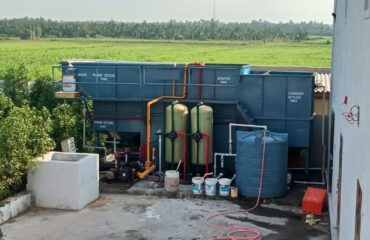Introduction
The automobile industry is a significant contributor to economic development, but it also presents environmental challenges, especially in terms of wastewater management. In Banswara, where industrial growth is on the rise, managing effluent from automobile manufacturing processes is crucial. An Effluent Treatment Plant (ETP) is essential for treating wastewater and mitigating its impact on the environment. This article explores the importance and benefits of ETPs for the automobile industry in Banswara.
Importance of Effluent Treatment Plant for Automobile Industry
Environmental Compliance
Automobile manufacturing processes generate a variety of pollutants, including heavy metals, oils, and chemicals. To comply with environmental regulations set by authorities such as the Central Pollution Control Board (CPCB), it is imperative for industries to treat their effluent before discharge. An ETP ensures that the wastewater meets regulatory standards, helping industries avoid legal penalties and contributing to sustainable practices.
Protection of Local Water Resources
Banswara, like many regions, faces challenges related to water quality and availability. Untreated industrial effluent can contaminate local water bodies, affecting aquatic life and human health. ETPs play a critical role in protecting water resources by removing harmful pollutants from wastewater before it is released into the environment.
Corporate Social Responsibility (CSR)
Implementing an ETP showcases a company’s commitment to corporate social responsibility. By actively reducing their environmental footprint, automobile companies in Banswara can enhance their reputation, gain public trust, and establish themselves as leaders in sustainable manufacturing.
Benefits of Effluent Treatment Plant
Reduction of Environmental Impact
An ETP effectively removes contaminants such as heavy metals, oils, grease, and chemicals from industrial wastewater. This reduction in pollutants helps in protecting ecosystems and maintaining biodiversity in the surrounding areas. Clean water discharge minimizes the environmental impact of industrial activities.
Cost Savings and Resource Recovery
Although installing an ETP involves an initial investment, it leads to significant cost savings in the long run. Treated water can be reused in the manufacturing process, reducing the demand for fresh water and lowering operational costs. Additionally, resource recovery techniques within ETPs can reclaim valuable by-products like metals and chemicals, which can be reused or sold, adding a revenue stream.
Enhanced Operational Efficiency
Modern ETPs are designed to integrate seamlessly with existing manufacturing infrastructure, enhancing overall operational efficiency. Automated monitoring and control systems ensure optimal performance, reducing downtime and maintenance costs. This leads to improved productivity and cost-effectiveness for automobile manufacturers.
Health and Safety Improvements
By treating industrial wastewater, ETPs contribute to a safer and healthier workplace. Reduced exposure to harmful chemicals and pollutants protects workers’ health, reducing medical expenses and improving morale and productivity. Ensuring a safe working environment is crucial for maintaining a committed and efficient workforce.
Conclusion
Effluent Treatment Plants are vital for the automobile industry in Banswara. They ensure compliance with environmental regulations, protect local water resources, and demonstrate corporate social responsibility. The numerous benefits, including reduced environmental impact, cost savings, operational efficiency, and health improvements, highlight the importance of ETPs for the sustainable growth of the automobile sector in Banswara.
Automobile companies in Banswara must prioritize the installation and maintenance of efficient ETPs. By doing so, they can significantly contribute to environmental preservation, promote public health, and establish themselves as responsible and forward-thinking industry leaders.





